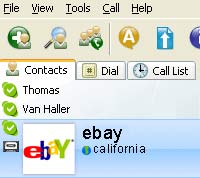 Rumours hotter than a double strength vindaloo are circulating major news organisations like the Wall Street Journal, Reuters and the Web that online auctioneers eBay are in talks to acquire the Internet-telephony company Skype.
Rumours hotter than a double strength vindaloo are circulating major news organisations like the Wall Street Journal, Reuters and the Web that online auctioneers eBay are in talks to acquire the Internet-telephony company Skype.
The Wall Street Journal is reporting the world’s largest online auction site could be heading for a major shift in strategy in a deal involving truly stratospheric figures of $2 billion to $3 billion. If you think that’s high, the New York Post are quoting $5 Bn as the price.
The paper reports that the talks are in a “sensitive stage” and – mindful of Skype’s earlier failures to close deals with other technology companies – could “fall apart” at any given moment.
(Simon Perry – The very fact that eBay could be getting around the table with Skype either reflects the company’s quest for new product categories and international markets, or they could integrate Skype into the service, offering purchaser and seller to talk to each other. Another option could be to use Skype’s ability to host group discussions as a way of strengthening communities with the same interests.
Although they still rule the roost for online auctions, their core business is maturing, leading the company to diversify into new markets such as rental-property listings, online classified-ad listings and comparison shopping.
Despite other online leaders such as Yahoo and Google ramping up the feature set and expanding into new territories, eBay has remained focussed on the task of acting as middleman between individual buyers and sellers. 
Their acquisition of the electronic-payment processing service PayPal in 2002 echoed their aim to simplify the business of buying and selling goods online, and an integrated VoIP service could provide a key element of that strategy.
Such a deal would also massively increase Skype’s presence, with eBay’s huge user base of 157 million technology-literate subscribers likely to be keen to adopt.)
Although market leader Skype currently enjoys huge popularity, their Big Cheese position is coming under considerable pressure as Google (Google Talk) and Microsoft (after recent Teleo VoIP purchase) tool up with their own VoIP offerings.
Optimistically, we gave Skype a call for their opinion (on Skype naturally) and got the expected, “Skype doesn’t comment on rumours” answer.
The ‘Skype for sale’ rumours are unlikely to go away after it was recently reported that they had hired investment banking firm Morgan Stanley & Co. to examine their options – including floating an IPO.
Back then Skype flatly denied that the company was for sale. Today, they didn’t confirm or deny this.
As Apple know, this is the best way to get written about, isn’t it?
We’ll see.
 Siemens have announced their new Gigaset SL75 WLAN Voice-over-IP (VoIP) cordless telephone for the home.
Siemens have announced their new Gigaset SL75 WLAN Voice-over-IP (VoIP) cordless telephone for the home. Decked out in (ahem) “the season’s high fashion colour night grey”, the Gigaset SL75 WLAN sports a colour display (128×128 pixels, 4k/65k colors) and comes with a small docking station.
Decked out in (ahem) “the season’s high fashion colour night grey”, the Gigaset SL75 WLAN sports a colour display (128×128 pixels, 4k/65k colors) and comes with a small docking station.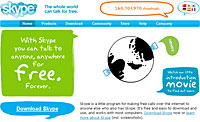 Skype has slapped hands and manfully patted backs with German network operator E-Plus as the VoIP giant secures their first 3G partnership.
Skype has slapped hands and manfully patted backs with German network operator E-Plus as the VoIP giant secures their first 3G partnership. The busy-bee Skypesters are said to be already hatching up schemes with a number of major handset and headset manufacturers – including Motorola – to develop a broader range of offer Skype-ready devices
The busy-bee Skypesters are said to be already hatching up schemes with a number of major handset and headset manufacturers – including Motorola – to develop a broader range of offer Skype-ready devices Skype currently claims more than 2.8 million Skype users in Germany.
Skype currently claims more than 2.8 million Skype users in Germany. From deep within the Microsoft base, Bill Gates has pulled a few levers and dispatched a corporate grabbing tentacle in the direction of Teleo, a privately held provider of VoIP software and services.
From deep within the Microsoft base, Bill Gates has pulled a few levers and dispatched a corporate grabbing tentacle in the direction of Teleo, a privately held provider of VoIP software and services.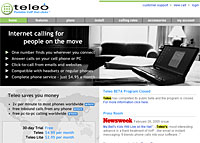 The San Francisco-based outfit Teleo was founded just two years ago and got as far offering a beta PC to PC or standard phone Skype-like VoIP service with click-to-call dialing through Microsoft Outlook and Internet Explorer before Gates grabbed the product.
The San Francisco-based outfit Teleo was founded just two years ago and got as far offering a beta PC to PC or standard phone Skype-like VoIP service with click-to-call dialing through Microsoft Outlook and Internet Explorer before Gates grabbed the product. Terms of the deal haven’t been disclosed, but Microsoft have said that members of the Teleo executive team will continue to work closely with MSN, while some Teleo product developers are expected to shuffle across and join MSN.
Terms of the deal haven’t been disclosed, but Microsoft have said that members of the Teleo executive team will continue to work closely with MSN, while some Teleo product developers are expected to shuffle across and join MSN.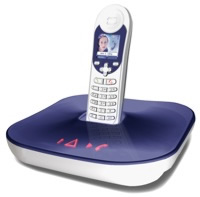 The acceptance of VoIP into the mainstream moved up a gear today with the release of a DECT VoIP handset, the plain-badly-named EV5203-C, from Thomson, the _huge_ French all-encompassing media company. The product is the first fruit from Thomson’s purchase of Inventel, earlier this year.
The acceptance of VoIP into the mainstream moved up a gear today with the release of a DECT VoIP handset, the plain-badly-named EV5203-C, from Thomson, the _huge_ French all-encompassing media company. The product is the first fruit from Thomson’s purchase of Inventel, earlier this year. However, he did manage to mention a couple of issues which aren’t directly about himself. For example, he said the following in regard to EPG’s, searching and the gateways to information – this is already a fundamental issue for regulators and one where we all need to pay close attention as to how they look to regulate…
However, he did manage to mention a couple of issues which aren’t directly about himself. For example, he said the following in regard to EPG’s, searching and the gateways to information – this is already a fundamental issue for regulators and one where we all need to pay close attention as to how they look to regulate…
 The program, Google Talk, is based on the open source Jabber protocol and competes directly with the three major providers of instant messaging – AOL, Microsoft and Yahoo.
The program, Google Talk, is based on the open source Jabber protocol and competes directly with the three major providers of instant messaging – AOL, Microsoft and Yahoo.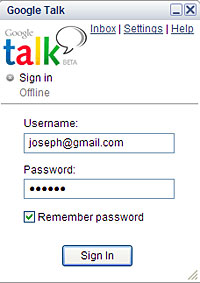 The software will let users have multiple voice sessions open at the same time, but only one can be active at any given time.
The software will let users have multiple voice sessions open at the same time, but only one can be active at any given time.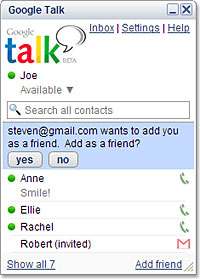 Currently, the three major messaging services are closed shops that generally don’t permit users to send messages to and from competing services – a source of continuing frustration for many IM users.
Currently, the three major messaging services are closed shops that generally don’t permit users to send messages to and from competing services – a source of continuing frustration for many IM users. Peter Saint-Andre, executive director of the Jabber Software Foundation, estimated that 13.5 million use the Jabber standard, based on figures from Osterman Research.
Peter Saint-Andre, executive director of the Jabber Software Foundation, estimated that 13.5 million use the Jabber standard, based on figures from Osterman Research. Many who used the original of Google Desktop Search loved it. If you had a mention of the word you’d searched for, whether it be in a word document, an email or even in a IM session, up would come the list of mentions.
Many who used the original of Google Desktop Search loved it. If you had a mention of the word you’d searched for, whether it be in a word document, an email or even in a IM session, up would come the list of mentions. Last week a lot of fuss was generated in the blogging world when Microsoft decided to refer to RSS as Web Feeds in their upcoming updated browser, Internet Explorer 7 Beta 1. It will be interesting to see if equal vitriol will be reserved for Google as they ‘rename’ RSS to Web Clips.
Last week a lot of fuss was generated in the blogging world when Microsoft decided to refer to RSS as Web Feeds in their upcoming updated browser, Internet Explorer 7 Beta 1. It will be interesting to see if equal vitriol will be reserved for Google as they ‘rename’ RSS to Web Clips. After a brief look at it, we found that it appears to have rectified one of the problems with the old version – primarily that it slowed your machine down when it was loaded. This slow down often was so significant that it caused those with slower/older machines, or those who actually needed the power of their processors, to remove it – despite its benefits.
After a brief look at it, we found that it appears to have rectified one of the problems with the old version – primarily that it slowed your machine down when it was loaded. This slow down often was so significant that it caused those with slower/older machines, or those who actually needed the power of their processors, to remove it – despite its benefits. Amazon is testing its new A9 mapping service that lets users view street-level photos of city blocks surrounding a requested address.
Amazon is testing its new A9 mapping service that lets users view street-level photos of city blocks surrounding a requested address. Amazon first introduced street-level photographs of specific addresses as part of its Yellow Pages listings, but the company believes that consumers will find the A9 service a more helpful view than Google mappings satellite views.
Amazon first introduced street-level photographs of specific addresses as part of its Yellow Pages listings, but the company believes that consumers will find the A9 service a more helpful view than Google mappings satellite views.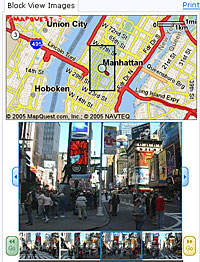 Not surprisingly, the horizon-challenged photographs ably illustrate that there’s none of Bresson’s magic in evidence, with pictures being automatically snapped by trucks equipped with digital cameras and GPS, receivers.
Not surprisingly, the horizon-challenged photographs ably illustrate that there’s none of Bresson’s magic in evidence, with pictures being automatically snapped by trucks equipped with digital cameras and GPS, receivers.